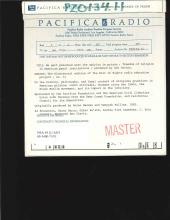This is the 11th in a series of 13 episodes. This program examines the history, philosophy, and legal context of religious practices in American prisons - court attitudes, changes since the 1960s, the Black Muslim movement, and its impact on the judiciary. Sponsored by the Pacifica Foundation and the American Civil Liberties Union Foundation with funding from the Deer Creek Foundation, St. Louis, Missouri; and the California Council for the Humanities, a state program of the National Endowment for the Humanities. Bicentennial Edition researched, edited, and produced by Adi Gevins, 1987; engineer, David Rapkin; announcer, Brenda Wilson; original program produced by Amina Hassan with Yemayah Rollins, 1982.
KPFA Folio, December 1987, p. 20: The Bill of Rights protects all citizens against government abuse of power in the matter of freedom of religion. But what happens to these rights once a citizen is incarcerated in a state or federal prison where the priority is to maintain security over individual expression? During the 1960s, the constitutional right of prisoners to practice their own religion was clarified, primarily through efforts of incarcerated Black Muslims. Today it is still an active issue as other groups – Jews, gays, and especially Native Americans – are seeking clarification and affirmation of their religious rights such as the building and maintaining of sweat lodges in prisons. This program examines the history and philosophical and legal contexts of the issue of religion in United States prisons—the courts' attitudes toward prisoner rights before the 1960s, the Black Muslim movement, and its effect on the judiciary. Participants and consultants include Al Bronstein, ACLU National Prison Project; Susan Harjo, National Congress of American Indians; Mikel Ba'ath, Muslim religious leader; Archie Fire Lamedeer, Indian Spritual Advisor; C. Eric Lincoln, Professor of Religion, Duke University; Reverend Ben Chavis.


